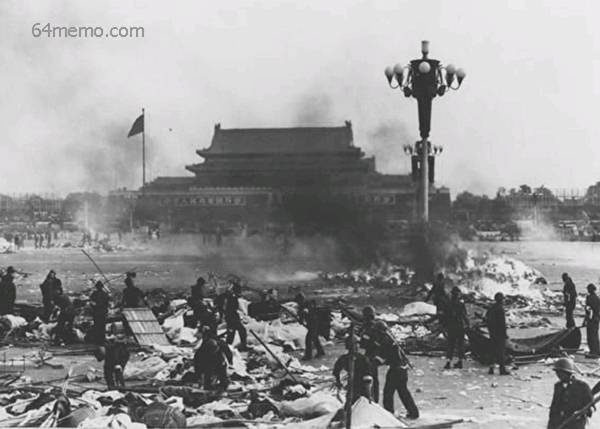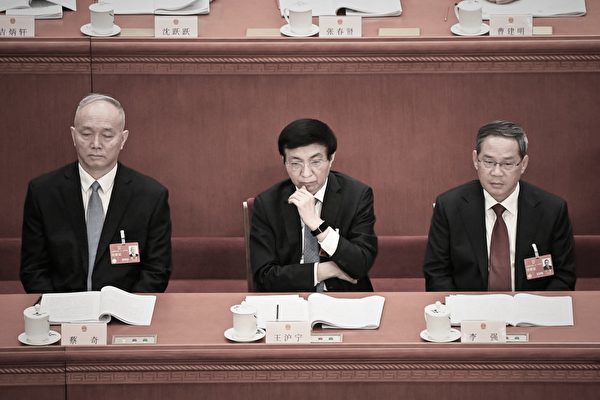Dark clouds hang over Tiananmen Square in Beijing. (Lintao Zhang/Getty Images)
[People News] Recently, overseas social media figures disclosed that an expanded meeting of the Political Bureau of the Central Committee was convened in Beijing on May 14, with the theme "Abolish Xi." This conference reportedly sent shockwaves through the intellectuals within the system who study the history of the Chinese Communist Party. They are particularly enthusiastic and have summarised the "Abolish Xi" conference, believing it to be on par with the Third Plenary Session of the 11th Central Committee of the Communist Party of China in 1978. They predict that Xi Jinping's fate may mirror that of Hua Guofeng from that era.
Economist and overseas social media figure Su Xiaohe revealed on his program on May 30 that a group of party history scholars within the system are especially excited, feeling that a significant event has transpired. They expressed that as "witnesses and participants in history, they feel very pleased."
Su Xiaohe noted that this group of insiders summarised the expanded Political Bureau meeting on May 14 with the term "Abolish Xi Conference," asserting that this meeting is comparable to the Third Plenary Session of the 11th Central Committee of the Communist Party of China in 1978.
Su Xiaohe pointed out that the Third Plenary Session of the 11th Central Committee had three main outcomes: first, it removed Hua Guofeng from power; second, it rejected Hua Guofeng's governance philosophy known as the two "whatevers"; and third, it emphasized that practice is the only standard for testing truth.
A group of scholars studying the history of the Communist Party of China has concluded that the recent "Abolish Xi" conference is aimed at removing Xi Baobao from power, dismantling Xi Jinping's so-called theory of socialism with Chinese characteristics for a new era, and discarding concepts such as "East rises, West declines," the "rise of great powers," the "community of shared future for mankind," and the notion of "unlimited ceiling on China-Russia relations." Essentially, everything Xi Jinping has implemented will be completely overturned, paving the way for new leadership. Su Xiaohe believes this assessment is quite reasonable.
Reflecting on the history of the Communist Party, former leader Hua Guofeng has undergone a gradual process of demotion and "exit" since the Third Plenary Session of the 11th Central Committee...
At the Third Plenary Session of the 11th Central Committee, the actual leadership of the Communist Party had already transitioned from Hua Guofeng to Deng Xiaoping, although Hua Guofeng still held the nominal titles of Chairman of the Central Committee, Premier of the State Council, and Chairman of the Central Military Commission.
The personnel changes at the Fifth Plenary Session of the 11th Central Committee indicated that while Hua Guofeng remained Chairman of the Central Committee, this role had effectively become a "figurehead position." During the Third Session of the Fifth National People's Congress, held from August 30 to September 10, 1980, Hua Guofeng resigned as Premier of the State Council, with Zhao Ziyang succeeding him as the third Premier.
The most significant shift in Hua Guofeng's role occurred during the Sixth Plenary Session of the 11th Central Committee, which took place from June 27 to 29, 1981. Before this session, Hua Guofeng had presided over all plenary meetings as Chairman of the Central Committee. However, the communiqué from the Sixth Plenary Session noted: The plenary session unanimously agreed to Comrade Hua Guofeng's request to resign from the positions of Chairman of the Party Central Committee and Chairman of the Central Military Commission.
Recently, The Epoch Times obtained information from authoritative sources indicating that while Xi Jinping, the current highest leader of the Chinese Communist Party (CCP), still appears to be in power, his influence has significantly diminished. Key figures in China's political landscape, such as CCP elder Wen Jiabao and Zhang Youxia, the first vice chairman of the Central Military Commission, have emerged as crucial players in shaping the country's political direction.
This raises the question: even if Xi Jinping steps down and a new group of leaders comes to power, will China find a new path forward? Observers believe that if the new leaders maintain the existing CCP system, they are likely to meet the same fate as Jiang Zemin and Xi Jinping. For the newly appointed leaders to genuinely revitalise the Chinese nation and guide China towards a brighter future, they must abandon the CCP system, dismantle the party, and return to traditional values.











News magazine bootstrap themes!
I like this themes, fast loading and look profesional
Thank you Carlos!
You're welcome!
Please support me with give positive rating!
Yes Sure!